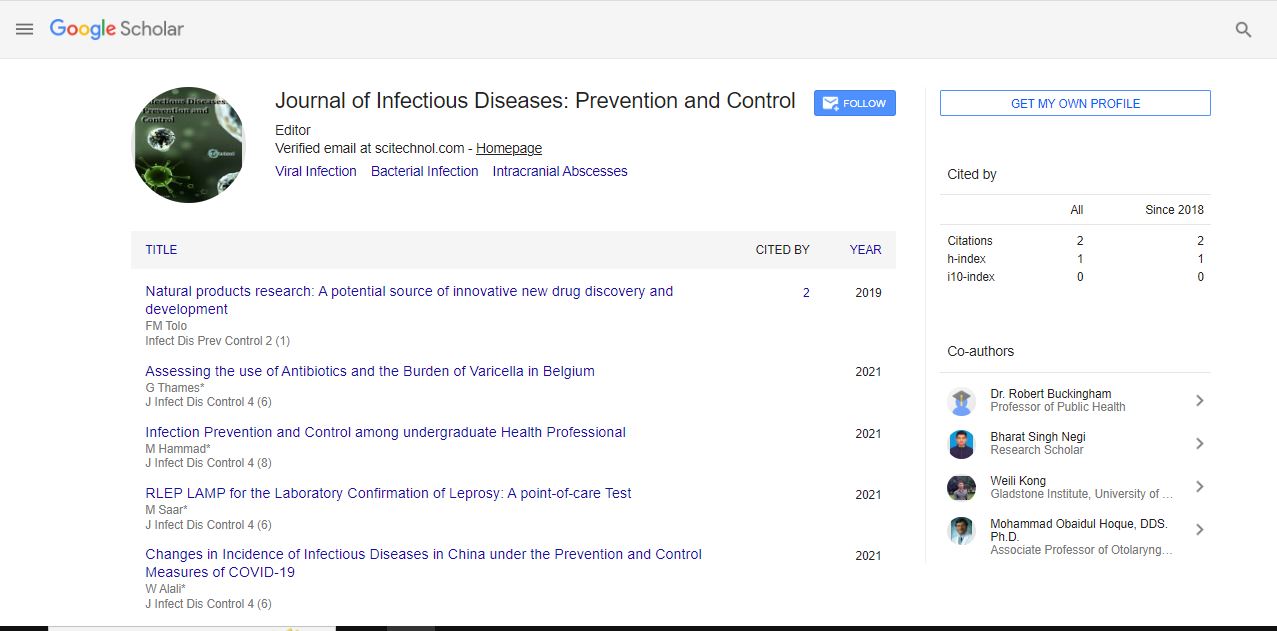Commentary, Vol: 6 Issue: 1
Immunomodulatory Nanosystems a Novel Approach to Combating Viral Infections
Janani Reisenauer MD*
Division of Thoracic Surgery, Department of Surgery, Mayo Clinic, Rochester, Minnesota
*Corresponding Author: Janani Reisenauer MD
Division of Thoracic Surgery,
Department of Surgery, Mayo Clinic, Rochester, Minnesota
E-mail: reisenauer@mayo.edu
Received date: 21 February, 2023, Manuscript No. IDPC-23-93456;
Editor assigned date: 23 February, 2023, Pre QC No. IDPC-23-93456(PQ);
Reviewed date: 07 March, 2023, QC No. IDPC-23-93456;
Revised date: 14 March, 2023, Manuscript No. IDPC-23-93456(R);
Published date: 24 March, 2023, DOI: 10.36648/idpc.5.2.123
Citation: Reisenauer MDJ (2023) Immunomodulatory Nanosystems a Novel Approach to Combating Viral Infections. Infect Dis Prev Control 6:1.
Description
Immunomodulatory nanosystems refer to a type of technology that utilizes nanoparticles to modulate the immune system's response. Nanoparticles are tiny particles ranging in size from 1 to 100 nanometers, and they have unique physical and chemical properties that make them useful for delivering drugs or other therapeutic agents to specific cells or tissues in the body. Immunomodulatory nanosystems can be designed to either enhance or suppress the immune response, depending on the desired therapeutic outcome. For example, nanoparticles can be engineered to deliver immunostimulatory agents that activate the immune system to fight cancer or infectious diseases. Conversely, nanoparticles can also be designed to deliver immunosuppressive agents to treat autoimmune disorders or to prevent organ rejection after transplantation.
One of the advantages of using immunomodulatory nanosystems is that they can target specific cells or tissues in the body while avoiding other cells or tissues that might be affected by traditional therapies. This targeted approach can help minimize side effects and improve treatment outcomes. Overall, immunomodulatory nanosystems represent a area of research for developing new and effective therapies for a wide range of diseases and conditions that involve the immune system.
Combating viral infections involves several strategies, including prevention, treatment, and vaccination
Prevention: Prevention is the most effective way to combat viral infections. The following measures can help prevent the spread of viral infections.
Good hygiene: Washing hands regularly with soap and water, especially before eating.
Social distancing: Avoid close contact with people who are sick, and maintain a distance of at least 6 feet from others in public places.
Masks: Wear a mask in public places, especially when social distancing is not possible.
Vaccination: Get vaccinated against viral infections like influenza, hepatitis, and Human Papilloma Virus (HPV).
Immune-boosting foods: Eat a healthy and balanced diet that includes immune-boosting foods like fruits, vegetables, and lean proteins.
Treatment: Treatment options for viral infections depend on the specific virus and the severity of the infection. Antiviral medications can be used to treat some viral infections, but they are not effective against all viruses. Treatment may also involve supportive care, such as rest, fluids, and pain relief medications.
Vaccination: Vaccination is a process that involves the administration of a vaccine, which is a biological preparation that helps the body develop immunity against a particular infectious disease. Vaccines contain a weakened or inactive form of the pathogen that causes the disease, or a small part of it, such as a protein or a sugar molecule. These components of the pathogen stimulate the body's immune system to produce antibodies and immune cells that can recognize and fight the pathogen if it enters the body again in the future. Vaccination is one of the most effective ways to prevent viral infections. Vaccines work by training the immune system to recognize and fight specific viruses. Vaccines have been developed for many viral infections, including influenza, hepatitis, and measles, among others.
In summary, preventing viral infections through good hygiene, social distancing, masks, vaccination, and a healthy diet is the most effective approach to combating viral infections. If an infection occurs, treatment options depend on the specific virus and the severity of the infection, and may include antiviral medications and supportive care.
 Spanish
Spanish  Chinese
Chinese  Russian
Russian  German
German  French
French  Japanese
Japanese  Portuguese
Portuguese  Hindi
Hindi 